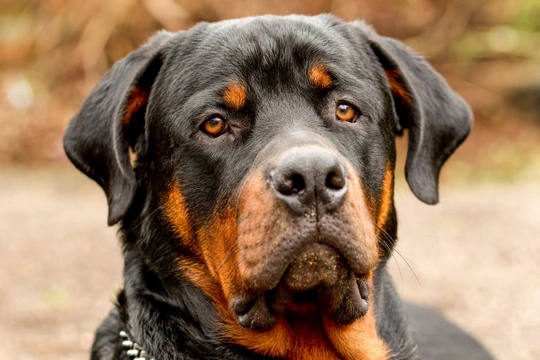
Recognising the symptoms of cancer in Rottweilers
The Rottweiler is a large, stocky and very muscular dog breed that makes for both an excellent family pet and a great guard dog, although dogs of the breed are more watchful than aggressive, and tend to be calm and speculative about greeting strangers rather than keen to see them off!
Their laid-back natures, love of their home comforts and unmatchable loyalty to their families make them excellent choices of pets for people from all walks of life and all manner of homes – but like all pedigree dog breeds, the Rottweiler breed as a whole is predisposed to certain hereditary health problems that can potentially affect their longevity and quality of life.
One particular group of health conditions that are prevalent across the Rottweiler breed as a whole is cancer of various different types – and many studies conclude that the Rottweiler is overall the dog breed that has the highest incidence rates of different types of cancers of all pedigree breeds.
However, because cancer is a systemic condition that will often affect the internal organs or systems rather than causing a tumour or obvious sign on the exterior of the dog’s body, knowing how to recognise the changes that occur in your dog during the early stages of cancer can be a challenge.
Prompt diagnosis of cancer in the Rottweiler and beginning treatment to cure the condition or limit and slow its spread is naturally the key to achieving the best possible outcome, keeping your dog comfortable, and where possible, reversing the spread of the disease.
For this reason, it is a good idea for all Rottweiler owners to appraise themselves of some of the most common systemic symptoms of cancer in Rottweilers, in order to be able to recognise them and intervene as soon as possible if a problem does arise.
In this article, we will look at some of the most common systemic symptoms that cancer of various types can cause in the Rottweiler, and how to recognise them. Read on to learn more.
Loss of appetite
Some forms of cancer can lead to loss of appetite in the Rottweiler, either because they affect the digestive tract itself, or because they make your dog feel generally unwell and reluctant to eat.
If your dog goes off their food and doesn’t recover their appetite within a couple of days, this bears investigation by your vet.
Unusual bowel movements
If your dog’s stools appear to be black or tarry-looking, this can indicate dry blood present in the poop, which indicates an internal problem. Bright red streaks of blood in the stools indicates fresh blood, and again, might mean something is amiss.
Any other ongoing problems or changes to your dog’s normal bowel movements – such as if their stools are frequently very hard, very soft, or if your dog has problems toileting – also bear further investigation.
Changes to drinking and urination patterns
Cancer can have a wide range of different effects on dogs, and some dogs with cancer may have an almost insatiable appetite for water, whilst others may become reluctant to drink. If your dog is unwilling to drink water or if they are drinking a lot more than normal and this is unrelated to the weather or their activity levels, something may be wrong.
Changes to the amount of water your dog drinks will of course affect their urine output too, so if your dog needs to go to the toilet frequently or urinates less than normal, this should be borne in mind too.
Poor physical condition
If your dog looks generally unkempt, has a dull, dry coat or seems to be losing condition and starting to look a little moth eaten for no obvious reason, always ask your vet to examine your dog to determine the underlying cause.
Weight loss and failure to thrive
Some dogs will go off their food when sick with cancer, which will naturally lead to weight loss, but particularly if your dog is eating normally or even eating more than normal but cannot maintain or gain weight, there may be an internal problem causing this, which should be investigated.
Poor wound healing and recovery
Small cuts, grazes and abrasions on the skin will generally heal on their own without any problems – but if your dog seems to bruise easily, is prone to getting scrapes and cuts, and does not heal within a normal timeframe, this can be one of the most easily overlooked symptoms of cancer.
Exercise intolerance
A Rottweiler with cancer will likely feel under the weather in general, and be reluctant to exercise and less tolerant of exercise than normal.
Generalised pain symptoms
Some types of cancer can be painful and uncomfortable, so if your dog shows signs of pain – such as problems moving around normally, discomfort, or sensitive areas of the body, it is important to find out why this is.
Changes in behaviour
Feeling chronically unwell can cause behavioural changes in your dog, which may manifest in a whole variety of ways.
Misbehaving in the house, failure to follow commands or aggressive behaviours that are out of character may all indicate a systemic issue like cancer.
Bad breath
Finally, the effects that cancer has on the whole of the body can cause problems like foul breath, unrelated to dental problems. If your dog’s breath starts to smell foul or otherwise changes for no obvious reason, this may indicate a food allergy or another internal issue, but cancer is one potential culprit that should be confirmed or ruled out.



